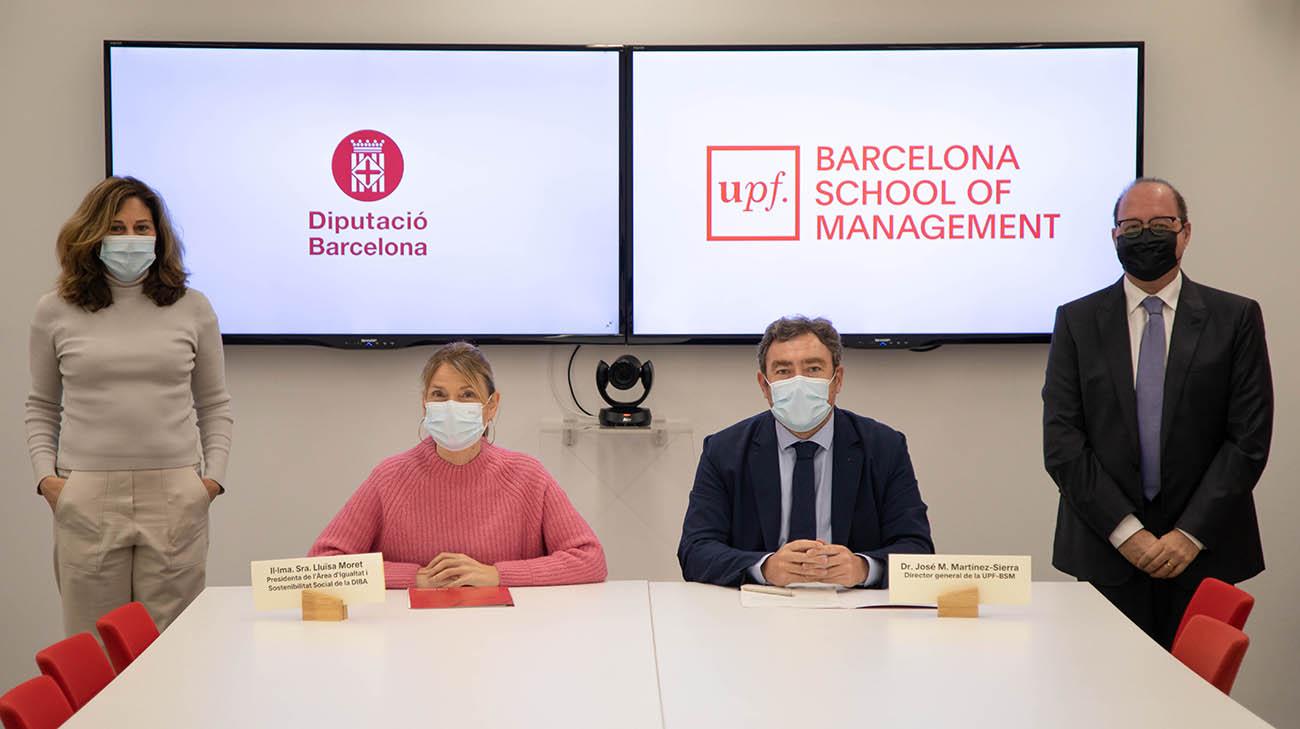
- About UPF-BSM
- Programs
- Faculty and research
- Companies and Organizations
- News & Events
UPF Barcelona School of Management and Diputació de Barcelona promote the Chair of Citizenship Mediation
10 Marzo - 2022
The UPF Barcelona School of Management (UPF-BSM) and the Diputació de Barcelona have signed this morning a collaboration agreement to promote the Chair of Citizen Mediation, which pursues research and social innovation to respond to the needs of the local world in the implementation of public policies to promote coexistence.
The signing ceremony, which was held at the UPF-BSM headquarters, was presided over by its Director General, José M. Martínez-Sierra; Lluïsa Moret, Representative for Equality and Social Sustainability of the Diputació de Barcelona; Ramon Bastida, Vice-Dean of Knowledge Transfer at UPF-BSM; and Javier Wilhelm and Maria Munné, co-directors of the Chair and the Master in Professional Mediation at UPF-BSM.
The Chair of Citizen Mediation aims to respond to the needs of the local world in the implementation of policies to promote coexistence
Restorative practices provide an opportunity to work to strengthen community links, build networks and do prevention so that when conflicts arise, people will have acquired skills to deal with them in a peaceful way. In this sense, the Chair will produce a conceptual framework from research and the collection of the most successful practices in local administration to facilitate the inclusion of restorative practices in the performance of teams working in mediation services.
The Director General of the UPF-BSM, José M. Martínez-Sierra, stated that "the Chair is a great opportunity to raise awareness and increase the implementation of mediation as a transformative tool and to bring it to the citizens". He added that "collaboration between the university and local administrations is a good formula for the transfer of knowledge".
"There is a lack of mediation culture, which is a great tool to increase the well-being of society and to prevent and resolve conflicts efficiently"
"There is a lack of a culture of mediation, which is a great instrument for increasing the well-being of citizens and for anticipating and resolving conflicts in the most appropriate and efficient way", explained Martínez-Sierra. Along these lines, he pointed out that in the "current situation of global conflict, our school's commitment to the culture of conflict resolution through alternative means is particularly relevant". "Mediation has proven to be a great tool and methodology", the Director General added.
Lluïsa Moret, Representative for Equality and Social Sustainability of the Diputació de Barcelona, highlighted the value of this agreement, pointing out that "for the Diputació de Barcelona, the work of research and generation of knowledge developed by the Chair is of great value to innovate in new methodologies in local administration so that the technical mediation services of the town councils of the province have working instruments for quality care and support for their neighbours in conflict resolution". This agreement makes it possible "to deepen the study of tools –restorative ones– which are fundamental for the work of promoting coexistence in the local world, as well as to reinforce the culture of dialogue", Moret explained.
Focus on local administration
The Chair aims to research and innovate in strategies to strengthen citizen coexistence networks from the university and the local world under the direction of Javier Wilhelm and Maria Munné, co-directors of the Master in Professional Mediation of the UPF-BSM.
Under the direction of Javier Wilhelm and Maria Munné, the Chair aims to strengthen the networks of citizen coexistence from the university and the local world
For its part, the Diputació de Barcelona, through the Department of Equality and Social Sustainability, promotes local public policies for the promotion of coexistence in the municipalities of the province, based on fostering neighbourly ties, non-discrimination and equal treatment, as well as the feeling of relevance of people in their municipalities and communities. Restorative tools propose techniques that help to make these policies concrete and effective.
"In today's changing world, research into how to restorate the coexistence of citizens will help us to have more mediating instruments in the years to come", Wilhelm said. "The aim is to foster a culture that admits disagreement", said Munné, who added that it is essential that the new methodologies "know how to respond to negative conflicts with peaceful forcefulness and not with violence".